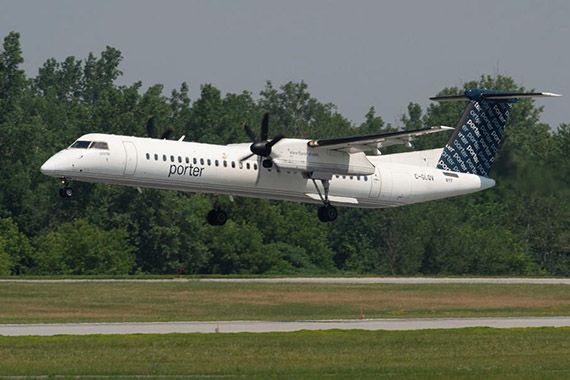Carrier Porter will eventually serve all major Canadian cities from Saint-Hubert. (Photo: The Canadian Press)
Longueuil – From late 2024, it will be possible to fly to Saint-Hubert Airport in the regions and connect there to fly anywhere in Canada.
This will make Montréal–Saint-Hubert Airport a true destination for travelers and a hub for Canadian flights.
The airport’s infrastructure department announced on Monday the construction of a terminal, a 130-seat hotel and the creation of Porter airline, which will eventually serve all major Canadian cities from Saint-Hubert.
“Everyone is excited about this announcement because when we talk about the economic, social and environmental development of a region, development inevitably involves the development of mobility,” said Transport Minister Geneviève Guilbault enthusiastically during the announcement.
Totally private investment
The terminal and hotel represent a $200 million (M$) investment made by Aéroport Montréal-Saint-Hubert in partnership with Porter Aviation Holdings and hotelier Holiday Inn without government support.
The infrastructure, construction of which is scheduled to begin in mid-2023 and be completed by the end of 2024, will have an annual capacity of four million passengers. Porter will also operate a free electric shuttle that connects the Longueuil-Université de Sherbrooke metro station every half hour, not only to the airport but also to businesses and educational institutions in the area where the school is located.
More regional flights
In addition to the Canadian service, Porter also plans to connect passengers from regional airline Pascan, which has to add other regional services at the same time. Pascan already serves many cities from Saint-Hubert, including Quebec, Saguenay, Alma, Roberval, Rouyn-Noranda, Val-d’Or, Baie-Comeau, Sept-Îles, Mont-Joli, Bonaventure and the Îles-de-la – Madeleine.
“For many of our Quebec regions, mobility includes regional air travel. It is important. The reliability, quality and frequency of regional air services is an important issue in many of our Quebec regions,” argued Ms. Guilbault.
The airport’s general manager Yanic Roy also specified that the addition of a terminal and a hotel is attracting great interest from other airlines. “We are currently in talks with several freight forwarders. We hope to make announcements in the coming months,” he revealed.
respect for the quality of life
But these airlines will have to get used to the idea: there will be no night flights and commercial flights cannot be operated with any device.
“The new terminal will be open from 7 a.m. to 11 p.m. From 2024, there will be a total ban on commercial flights (at night) on the airport territory,” said Longueuil Mayor Catherine Fournier. In addition, the aircraft used will produce 65% less noise than average and 25% less pollutants.
The expansion of airport activities had to be the subject of close negotiations with the community, whose citizens were extremely skeptical about such a development and who had complained many times about noise for decades.
“What we have observed, says Ms. Fournier, is that the majority of the population supports the expansion of the airport, provided that it meets certain social acceptability criteria. Of course, the quality of life for the local residents comes first.”
An unjustified addition of greenhouse gases
Though the mayor speaks of consensus and the transport minister claims everyone is excited, that didn’t stop a dozen protesters from showing up at the entrance, signs in hand, to denounce a decision they say will add planes to the sky.
“We want there to be a moratorium to be able to evaluate any project that might develop, to see its impact, solid of course, but also its health impact, its climate impact,” said its representative, Jacques Benoît, of the organization Urgence climatique Montérégie, which is part of the Coalition Halte-Air Saint-Hubert.
For the coalition, planes that make less noise and pollute less are not a solution. “We will not succeed in curbing the climate crisis and global warming by building more airports, more airplanes,” lamented Mr. Benoît.
“Air pollution from greenhouse gases is the invisible elephant in the room and the most dangerous. The only thing we could have would be airplanes with zero greenhouse gas emissions. We’ll be told it’s unrealistic, but that’s where we need to go. We must get out of this global warming or we will all die from it,” he concluded.

Incurable food practitioner. Tv lover. Award-winning social media maven. Internet guru. Travel aficionado.





;Composite=(type=URL,url=https://images.radio-canada.ca/v1/assets/elements/16x9/outdated-content-2013.png),gravity=SouthEast,placement=Over,location=(0,0),scale=1)

